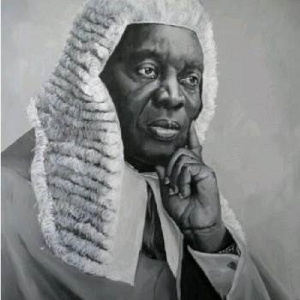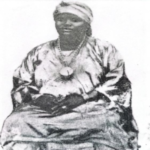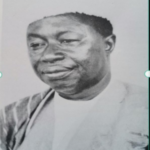
SIR KOBINA ARKU KORSAH
Sir Kobina Arku Korsah (April 3, 1894 – January 25, 1967), was the first African chief justice of the Gold Coast (1956-57), and the first chief justice of Ghana (1957-63) after independence. He was influential in national political life from about 1928 onwards.
He was born at Saltpond, a fishing port east of Cape Coast, and was the son of Andoh Korsah, a prosperous merchant. He was educated at Mfantsipim School, Cape Coast, and at Fourah Bay College, Freetown, Sierra Leone, from which he graduated with a B.A in 1915. He entered Durham University in England, graduating with a B.C.L. (Bachelor of Civil Law) degree in 1917, and in 1919 graduated LL.B from London University, and was called to the Bar at the Middle Temple. In his student days in England he took part in anti-colonial politics from 1917 onwards, when J. E. Casely Hayford (q.v.) was working to form the National Congress of British West Africa.
He returned home to the Gold Coast in 1919, and practiced at the Bar, specializing in commercial law. He entered Gold Coast politics, and was appointed assistant secretary to the Cape Coast branch of the National Congress of British West Africa in 1922, becoming an executive member of the Aborigines’ Right Protection Society (A.R.P.S) in the same year. At this time a fierce disagreement had developed between the intelligentsia, led by J. E. Casely Hayford, and the paramount chiefs, led by Nana Ofori Atta I (q.v.). The breach was widened by the proposed Guggisberg constitution of 1925, which gave the chiefs a majority of the seats in the legislature. The A.R.P.S., which resented the establishment of the provincial councils of paramount chiefs and other similar measures, had urged all its members to boycott the Legislative Council by oath.
Korsah, although a friend and adviser of Casely Hayford, felt that much would be gained by establishing cooperation between the chiefs and the intelligentsia, and wanted Casely Hayford to settle the quarrel. He therefore defied the society’s oath, and won the municipal seat for Cape Coast in 1928.
Upon entering the council, he gained an introduction to Nana Ofori Atta through his own school-mate and friend, Nana Ayirebi Acquah, the Omanhene (paramount chief) of Winneba from 1926-38, and subsequently managed to settle the quarrel between the chief and Casely Hayford.
From March 1929 until Casely Hayford’s death in 1930, Korsah gradually brought the municipal membership of the Legislative Council and the chiefs on the provincial councils together to cooperate for the national good. A sort of “shadow cabinet” was formed by the African members of the Legislative Council, who always met before sessions to decide on a united front. These meetings continued till 1943, and the unity they represented was Korsah’s greatest political achievement.
In 1934 he was a member of the Gold Coast delegation which traveled to London to protest against two bills, the Sedition Bill, which extended the definition of sedition, and the Waterworks Bill, which sought to shift responsibility for the costs of the water supply of the coastal cities from the government to the citizens. The delegation’s failure made Korsah unpopular.
J. B. Danquah (q.v.), who had been secretary to the delegation, was regarded as a better nationalist, and on his return from Britain in 1936, dominated the political scene outside the Legislative Council. The relationship between Korsah and Ofori Atta on the one hand, and Danquah on the other, became strained, because of Danquah’s criticism of the two men. But the breach was partially healed during the cocoa boycott of 1937-38, when a united front of chiefs and people was formed.
Korsah gained a reputation as a debater in the Legislature Council. He was a champion of the Africanization of the civil service, and in 1937 when the Native Administration (Amendment) Bill was being debated, he urged the government to allow the African members of the council a say in the operation of the native administration. He wanted the Legislative Council to have powers where the liberties of the individual were concerned, and opposed the monopoly of such powers by the governor-in-council. He also wanted taxation to be imposed only with the agreement of the people’s representatives.
The Courts Bill of 1940, which defined the jurisdiction of the various courts, including Native Courts, was modified through his influence. He attacked bulk purchases of cocoa by the British government during World War II on the grounds that these deprived local producers of bargaining powers . He resented the numerical strength of the official members of the Legislative and Executive Councils, and lobbied against it.
Between 1933 and 1940, he helped to shape government policies by serving on various Legislative Council Committees, dealing with legislation concerning forced labor, workmen’s compensation, money lending, and similar matters.
In 1942, together with Dr. J. B. Danquah and Kojo Thompson, both barristers (attorneys), he was appointed by the Joint Provincial Council of Chiefs to a three-man committee to draft a new constitution for the Gold Coast. The committee proposed a ministerial form of government, with Africans as political heads of the ministries. Although this was rejected by the British at the time, a ministerial government with Africans as ministers was later accepted in 1951.
After Korsah lost his seat on the Legislative Council in 1940, he and Nana Ofori Atta had been appointed to the governor’s Executive Council. In 1943-44, he served on the Elliott Commission, a body appointed by the British government to study the whole question of the college and university education in West Africa, and signed its majority report which recommended that existing colleges in the Gold Coast, Nigeria, and Sierra Leone should be developed to a university standing, rather than having a single University established in Nigeria.
His interest in education was a continuing one. He was a member of the Board of Education, and of the Central Advisory Committee on Education. In 1951 he became chairman of the Council of the University College of Gold Coast, a post from which, after it had become the Council of the University College of Ghana, he was dismissed in June 1961 by President Kwame Nkrumah (q.v.)
In 1945 he was appointed a puisne judge, a position he held until 1956, when he became chief justice of the Gold Coast, and a justice of appeal of the West African Court of Appeal. Upon the coming of independence, he became Chief Justice of Ghana.
Korsah had left politics before the United Gold Coast Convention (U.G.C.C) was formed in 1947, but his past differences with Danquah led him to oppose Danquah and the U.G.C.C. and to support Kwame Nkrumah and the Convention People’s Party (C.P.P.) behind the scene. He was accused by opposition politicians like Danquah and Dr. Kofi Busia of favoring the C.P.P. on the Bench. When he was chairman of the commission which inquired into allegations of bribery and corruption in the first Nkrumah administration (1953-54), his report was severely criticized. The opposition came to regard his appointment as chief justice as a reward for services rendered.
After independence in 1957, Korsah acted as governor-general on several occasions. In this capacity, he was required to sign controversial legislation, and orders for deportation, as well as an instrument which appointed Krobo Edusei, a C.P.P. member of parliament, as a minister, despite the fact that in his 1954 report he had declared him to be unworthy to hold public office. When the Preventive Detention Act was passed in 1958, Danquah had expected Korsah to deliver an authoritative judgment against it. He did not, however, and was one of the judges who upheld its validity under the Republic constitution which came into force in 1960.
On July 1, 1960, he was appointed chief justice of the Republic of Ghana. Under the 1960 constitution, the chief justice could be removed by the president acting at his discretion, while in his capacity as a judge he could be removed by a vote of two-thirds of the members of Parliament. When the Criminal Procedure (Amendment) Act, better known as the Special Courts Act, was passed in 1961, Korsah did not advise against it, and later sat on such courts on treason cases tried under the Act.
In 1963 he presided over two treason trials. In one of them the three accused – Ako Adjei, former Minister of Foreign Affairs, Tawia Adamafio, former Minister of Information and Broadcasting, H. H. Cofie-Crabbe, former executive secretary to the C.P.P. – were acquitted. President Nkrumah promptly removed Korsah as chief justice on December 11, 1963, and Korsah decided to retire from the bench on that date.
In January 1964, after a Ghanaian policeman named Ametwee had attempted to assassinate Nkrumah, it was reported that Ametwee had mentioned Korsah’s name as one of those plotting to overthrow Nkrumah. Security men detained Korsah for interrogation for some hours, but found no evidence against him. He was released but kept under house arrest until February 24, 1966, when the Nkrumah administration was overthrown by a military coup.
After the February coup, Korsah led a Ghana delegation to East Africa and Ethiopia. He was, however, a broken man, and died in January 1967.
During his career, he received several decorations. He was awarded the Order of the British Empire (O.B.E.) in 1937, was knighted in 1955, and became a knight of the British Empire (K.B.E.) IN 1960.
L. H. OFOSU-APPIAH


